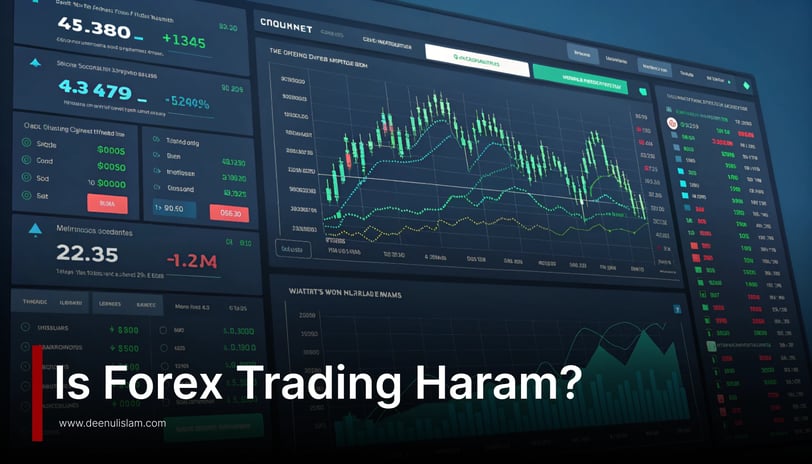What is the Islamic Ruling on Forex Trading?
2 min read


In recent years, forex trading has become popular worldwide, including within our Muslim community. Forex, or foreign exchange trading, involves buying and selling currencies to make a profit. Many are drawn to it because of the potential for quick and substantial gains. But as Muslims, we must ask: Is forex trading halal (permissible) or haram (forbidden) in Islam?
To understand the ruling, we need to look at some core principles of Islamic finance and how they apply to forex trading.
Why Forex Trading is Problematic in Islam
As it is commonly practiced today, forex trading is generally considered haram for several reasons. These reasons are based on key concepts that are forbidden in Islam: riba (interest), gharar (excessive uncertainty), and maysir (gambling). Here’s why:
Riba (Interest): A major issue with forex trading is the use of leverage. Leverage allows traders to borrow money from brokers to trade with a much larger sum than they actually possess. However, when positions are held overnight, interest (riba) is charged on these borrowed amounts. In Islam, engaging in or benefiting from interest is strictly prohibited. Even if some brokers offer “Islamic accounts” that are swap-free (interest-free), these accounts do not resolve all the issues.
Maysir (Gambling): Forex trading also involves a high level of speculation. When traders bet on whether a currency will increase or decrease in value, it becomes similar to gambling. In Islam, making money through such guesswork, without any tangible economic activity or ownership of real assets, is haram. Islam forbids making wealth purely through risky and speculative behavior.
Gharar (Uncertainty): Forex trading contracts often come with a level of ambiguity and risk. Many trades do not involve the actual exchange of currencies but rather contracts based on price movements. This uncertainty and lack of clarity in the transactions add to why forex trading is impermissible.
The Problem with Islamic Forex Account
Some forex brokers have developed “Islamic accounts” for Muslim traders, aiming to eliminate riba by removing overnight interest fees. For instance, instead of charging interest, brokers might apply a fixed management fee or close and reopen positions to avoid interest payments. Despite these adjustments, the issues of gambling-like speculation and uncertainty remain. The fundamental act of betting on currency price movements continues to be haram.
Permissible Currency Exchange in Islam
It is important to differentiate forex trading from the legitimate exchange of currency for everyday use. When we exchange money for travel or send funds abroad, this is halal. These transactions are immediate and involve the physical exchange of one currency for another. Known as “spot” transactions, they meet Islamic requirements, as there is no interest, gambling, or excessive uncertainty involved.
Halal Investment Alternatives
From an Islamic perspective, there are many halal ways to invest our wealth. Instead of participating in speculative currency markets, we are encouraged to put our money into real, ethical assets such as:
Commodities: Gold, silver, or agricultural products.
Halal Stocks: Shares in companies that operate in permissible industries and follow ethical guidelines.
Real Estate: Investing in property to rent or for long-term gains.
These investments should be made without leverage or speculative practices. Islam encourages us to invest in ways that support real economic activity, promote fairness, and avoid unnecessary risk.
Based on the principles of Islamic finance, forex trading in its current form does not align with what is halal. The involvement of riba, speculative gambling, and uncertainty makes it impermissible. Even Islamic forex accounts fail to address the fundamental problems. As Muslims, we are advised to seek halal, ethical, and beneficial investments that align with the teachings of our faith.
And Allah knows best.
Navigate
Duas
Guides
Articles
Follow us around internet.
© 2024 Deenulislam · All Rights Reserved
